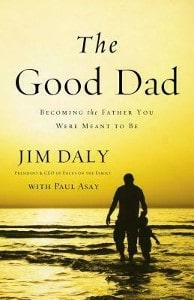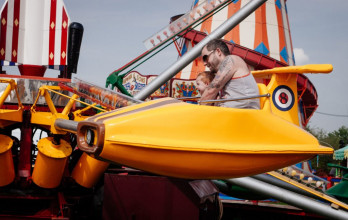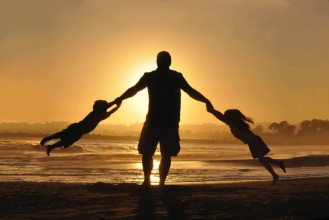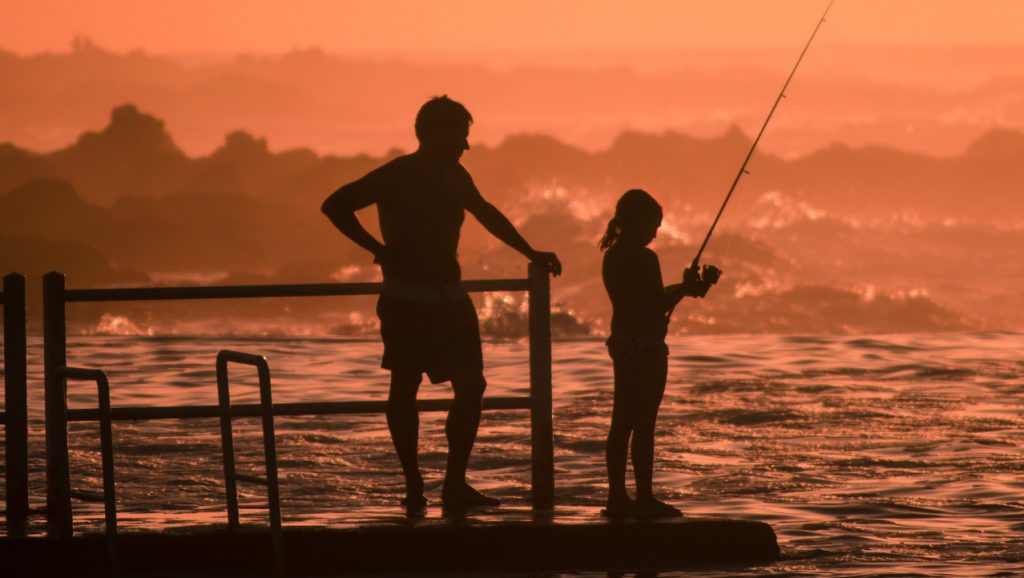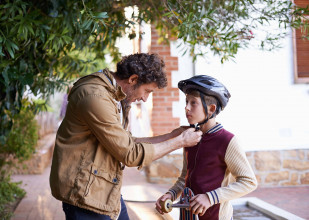David Clarke: My dad, Bill Clarke, is really the godliest man I have ever known.
Dan Chun: When I think of my dad, I think of his character and integrity that when no one’s looking, he was there trying to do the right thing.
Roland Warren: There’s amazing opportunity that every father has to, to be a representation of our Heavenly Father in a human form. And, uh, when you do that, not only will you be blessed, but your kids will be blessed.
John Fuller: You know, every dad makes a lasting impression on his children, an incredible imprint that’s never forgotten. This is Focus on the Family with your host, Focus president and author, Jim Daly. I’m John Fuller, and today, we’re gonna help you see that many dads are getting it right these days.
Jim Daly: They are, John, and since Father’s Day is this Sunday, we wanted to honor the contribution dads are making by sharing some treasured memories from some of our past guests on the program. And many of you know, I didn’t have a great dad in my life. Um, he was out of my life pretty early, but there are still good things that you can remember, even if you had that kinda tough experience. Uh, we asked a number of authors and speakers to answer a simple question: what impact did your dad have in your life? And their answers I think are reflective of that impact a dad can have. And we’ve got more than a dozen great stories for you today.
John: We’re gonna begin with Joni Eareckson Tada as she reflects about her father relating to her diving accident and being in a wheelchair as she was a young adult.
Joni Eareckson Tada: Not long ago, my husband, Ken, was cleaning out our garage, and he came to the kitchen door holding up a pair of old Canadian crutches, and he said, “Joni, do you wanna dump these?” Well, I stared at those dusty crutches, and my throat tightened, and I said to my husband, “Those are daddy’s.” (laughs). The aluminum was scraped, the rubber tips were scuffed, but, um, those crutches suddenly brought into focus a flood of memories. All through my daddy’s 70s and 80s, he would hobble around on crutches due to arthritis. Um, he had to use them to shove around chairs, boxes, uh, he even used a crutch to ring a doorbell (laughs). And on a good day, he could hit a ball tossed to him by a grandkid. Um, around the farm, we could always tell when daddy was off on a horseback ride because there his crutches would be, leaning against the hitching post. Well, when I broke my neck, and when I was in the hospital, I could always tell when my father was coming for a visit because I would hear echoing on the hallway tile, click, click, click click. “Oh boy,” I would think, “Daddy’s here.” I’d be so excited. ‘Cause I felt that he, more than anyone else in the family, understood my situation. He understood limitations. And this is why that clicking sound for me was so welcomed. The bible talks about the beauty of feet that bring good news. (laughs). That even includes crutches. And I think it’s a good lesson for you listening today. Think about it, what, what do people think of you when they hear the sound of your feet coming? Well, my daddy taught me such an important lesson. May we always be heralds of God’s good news wherever we go. Oh, by the way, just last week I gave my daddy’s crutches to Wheels for the World. That’s our outreach and Joni and Friends where we take mobility equipment overseas to give to disabled people in developing nations. I finally had to let them go, and I let them go because I know that God’s good news must be released. So, with those crutches, they will be heralds of the gospel of Jesus, no matter where they end up, or whoever uses them. Thank you, daddy, for teaching me such a good lesson.
Kimberly Wagner: I was spending my last hours with my father, and I am, I am so thankful for how actually he prepared me for that day. My dad was one of those men who he was always there for me, and the difficult days, and the days to celebrate, he was there for me. And, in the middle of the night, when I was a scared little girl with nightmares, he would be the one that would sit there and talk me through that. The last ten years of my dad’s life, he struggled with lymphoma, which eventually went to his brain. So in his final four years, he went from being a highly intelligent man, strong, almost invincible, to being very childlike. Emotional, needy, fearful. So I promised him, all along the way, “Daddy, when it comes time for you to go, I will not leave your side. I will be here for you just like you were here for me.” And so in those final hours, God was gracious to give me many sweet days with my dad as he transitioned from this life to the next. I am so thankful for a dad who was there for me and was an example to me of my Heavenly Father’s faithfulness and love.
Lorie Newman: He always, when I was a little girl, made me feel as though every little thing that I did was important. One Christmas, I’ll never forget, that we were headed to grandmother’s house, and it was the first time that we would be away for Christmas Eve and Christmas morning, and I was so afraid that Santa would not know that I wasn’t home, and he would leave the gifts at the wrong house. So I wrote a note, and my dad literally got the ladder out of the garage, and I watched him climb up onto the roof, shimmy across, and nail that letter to the chimney. My dad always wanted me to know that if it was important to me, it was important to him. And now that I am an adult, and I know a few things about Santa Claus that I did not know then, it makes it all the more special what my daddy did for me when I was little.
Phil Vischer: I’m Phil Vischer, and my father had a huge impact on me. He was creative, uh, he was a storyteller. Very funny. Very, very creative. Much of my creativity came from him. Uh, but when I was nine years old, my parents split up, and my dad came down the stairs with a suitcase and kissed me on the forehead and walked out the door. And, uh, my life was split in two. The half before my dad left, and the half after my dad left. Um, it was difficult for me to be close to people after that because I was afraid anyone I was close to would leave. But God worked on that, and, uh, and healed that through my wife, who committed to stay with me (laughs) forever. Uh, through friendships, and ultimately through the love of God himself so that when I had my own kids, I remember when my daughter turned nine, the age I was when I walked my, watched my dad walk out, and I was still there for her. And I remember thinking that I can heal this for my kids so they will never experience what I experienced. And every year I’m with my kids, my wife and I have been married 25 years now, is a grace of God that I have been able to give my kids what I didn’t have. It’s a blessing to be a father.
Leroy Wagner: My father’s generation has been called by some the greatest generation. And my father, like many of those men in that generation, showed very little emotion, very little affection. He worked hard, he provided for his family, at great cost to himself personally. Sacrificed, was unselfish. He valued integrity and honesty. And although he wasn’t a Christian, he did all that he could to provide for his family. I saw my father as strong, as, uh, indomitable, invincible, could do anything. But then, when my brother was 21 years old, he had an accident which severed his spine. My father and my mother were out of, out of town, and they were called and drove all night, 14 hours to come back. We were at the hospital with my brother who had gone through surgery, and I saw my father coming down the hall. The man that was, to me, the strongest man that I’d ever known. Could do anything, could fix anything. I saw him coming down the hall, and for the first time, I saw my dad, uh, saw that he was weak. I saw that, uh, his, uh, strength was not there, and I knew that in his human weakness, that he had a strong love that a father has for his children because for the first time in his life, I’d seen my father broken. And he was broken out of love for my brother, and, and the pain that he was in and what he had experienced. And so I’m thankful for my father’s love that I saw on that day, that very painful day, that he was not able to express to us in words or affection, but nonetheless, he held it in his heart.
Vicky Courtney: My dad is incredibly patient. Um, I remember when I was in college and he came in and, um, from out of town, and his own father was passing away, my, my grandfather, and didn’t have much longer to live, and we were driving, um, to go see him, and halfway there, we stopped at a restaurant, and in haste when we left, I left my purse at the restaurant, but I did not discover it until about an hour on down the road and mentioned it to my dad, and he said, you know, “Oh, that’s no problem, honey. We’ll just (laughs) turn around and go back and get it.” And I’m sitting there, you know, thinking at that point, I, I was a new mother. My oldest son, um, was about maybe nine months old, and I’ll never forget that because I remember thinking, you know, that at times, I could be so impatient with of course having a new baby and, um, you know, but that example that my father set there with patience.
John: That’s Vicky Courtney sharing a fond memory of her father on today’s episode of Focus on the Family with your host, Jim Daly. I’m John Fuller and as Father’s Day is coming up, uh, Jim, uh, Dena and I have six kids, as you know, and each of those children are unique. Um, what a privilege it has been to be their dad and to reflect back on all the times when we’ve had connections, I’ve been able to pour into them. They’re all over the map when it comes to what they’re doing in life, where they’re at spiritually, but it’s been so wonderful to be able to be with them for the distance. To be there, uh, even now as they’re adults.
Jim: Yeah, it is fun, uh, the boys and I are now reminiscing about the fun things that we-
John: The good ol’ days.
Jim: Yeah.
John: Yeah.
Jim: And just the, the great memories of th- kind of that father son relationship.
John: Mm-hmm.
Jim: And so often as dads, we can feel like we’re failing. Uh, like we’re not doing enough. It’s not adding up. We’re inadequate. Uh, being a dad is challenging, and there’s no doubt, uh, as that journey continues, that you’re gonna have wins and losses, right?
John: Mm-hmm.
Jim: But God’s grace is sufficient for all of us.
John: And that sure is a comfort, uh, a whole lot of the time of parenting.
Jim: It is, and we want to provide a little bit of encouragement for you today as a dad. I wrote a book called The Good Dad, and in it, I shared about how we rely on God in parenting our kids through the messiness of life. And I wanna encourage you, as a dad, to become a better father every day by building relationships with your children through love, grace, patience, and fun, the fruit of the spirit, to help them grow into mature adults. So I hope you’ll get this book from us. Uh, with a gift of any amount to Focus on the Family today, we’ll send you a copy of The Good Dad as our way of saying thank you.
John: Yeah, partner with the ministry, donate, and get Jim’s book when you call 800, the letter A and the word, FAMILY. Or online, you can find details at focusonthefamily.com/broadcast. And we’re hearing about how dads impact their children’s lives, and there are various comments that we recorded from broadcast guests. Now we’re gonna hear from, uh, another, Sue Acuna, and, uh, she shares about something special that happened late in her dad’s life.
Sue Acuna: Hi, I’m Sue Acuna, middle school teacher, author, speaker, and when I was growing up, it was my mom who took us to church, and my dad never went to church except on special occasions like, oh, a baptism or a confirmation, and even then, he would walk in and look up and say, “Whoa, pretty strong church. It didn’t fall in when I came in.” And my sisters and I spent a lot of time when we were teenagers and young adults, praying for dad, that dad would come to know Jesus, that, that he would be a Christian. And, and he was just always content to let us be the ones who, who went to church and took our kids and, and he would only show up for those special occasions. Near the end of his life, when he decided to go off dialysis and we knew that, that he didn’t have much longer to live, my sister had some time alone with him, and she said, “Dad, do you, do you know what’s gonna happen when you die?” And, and he said, “Well, no, not really.” And she talked to him about going to Heaven and, and accepting Jesus as his Lord and Savior and asked him if he wanted to do that. And he said, yes, he did. And so she prayed with him, and he began crying. And my father, being a, a stoic Asian man, did not cry often. And she asked him if he wanted to be baptized, and he said, yes, he would like that. Which is something my mother had been praying for for more than 40 years. And so, the pastor came in. He was, my father was in a nursing home, the pastor came in and, and my father was baptized, and ten days later, he died. And so, we had the f- the hope and the faith of knowing that one day, we will see him in Heaven. I figure he’s up there fishing, and you know, catching all the fish he ever wanted to catch, and that has given me a story of hope to share with my students and with my friends to say never give up. Never give up praying. It’s never too late. Never give up asking the question, “Do you know who Jesus is?”
Paul Coughlin: I’m Paul Coughlin, founder and president of The Protectors, an anti-bullying organization, and I have so many great memories of my father. I mean, I really adored him, uh, in so many ways. He, he was a Irish immigrant, and very quiet. He, uh, treated words as if he would be taxed on them, so I think he said like 12 a day, uh, sometimes. But I remember once, I was a paperboy in Southern California and, uh, this one elderly couple said that I broke their window, uh, when delivering, uh, newspapers. And there was just no way that’s gonna be the case. And I was just heartbroken and scared to death and thought I was gonna lose my route and all d- to have to pay for the window. So my father, who was a painter, a house painter, worked very hard, uh, brought me to this elderly, uh, couple house, apartment, and, uh, we looked at the window and went inside. And I just remember it being a really kinda very scary affair for me, and my dad, he did this, we were leaving, and he does this kind of Columbo, uh, second take, and he looks back, and he looked at the window, and he said, in his Irish brogue, uh, “It’s broken from the inside.” And I remember, I remember him defending me, and it was this really, with this quiet strength, he was, he never felt he had to yell to get his point across, but, uh, he was my defender that day, and he, you know, in my mind, he grew to be eight foot tall, and I just really appreciated it.
Carolyn McKinstry: I have four brothers, and the notion of trying to raise four young men and two daughters, but to raise those four young men in a way that they don’t get in trouble, uh, with the law or that they’re not locked up, to inspire them and encourage them in such a way that they wanna grow up and do some meaningful things in this life, you know, to make a contribution, was a tremendous job. And, um, all of my brothers are, uh, very gracious men today. Uh, they all cook. They all clean house. And they, uh, they grew up to be like my dad.
Dan Chun: I remember for the longest time, I would ask my dad if he could play football with me in the backyard. I wanted him to punt the football to me and then I would catch it. We would throw the football at times. And so, he did come out, and he punted the ball and threw it in the hot sun in Hawaii, and, and later, my mother said, “You know, you shouldn’t ask your dad to do that. You know he’s asthmatic. You know he’s much older, ’cause he’s 40 years older than you.” And I was touched by, that my dad would do anything it would take to spend time with me, to play with me, even though his health wasn’t the best, and he would go out there and do something that was strenuous for him at that time, uh, due to his health. And so I was always impressed with Dad’s love for me to do that.
Lysa TerKeurst: I’m Lysa TerKeurst with Proverbs 31 Ministries, and I had a very difficult relationship with my dad, and honestly, um, it wound up being that my dad and I just, our relationship kinda fell apart, and he decided that, um, he didn’t really wanna have any kind of a relationship with me. This was so hard, because the heart of a little girl longs to have a connection with her daddy, but that just was not gonna be possible for me with my dad. And so for years, I really grieved that. And, um, so it just deepened my sense of rejection, and it was so difficult. So, one day I was praying to the Lord, and I just said, “God, I have to have some kind of healthy perspective because this is hurting my heart over, and over, and over again, and every time someone mentions something with their dad, it’s such a hurtful reminder of what I don’t have with my dad. And, um, Lord, if you could just give me one good memory so that every time the topic of dads came up, that I could intentionally make my brain focus on that one good memory with my dad, that would be such a gift.” And then, one winter morning, I woke up, and I was looking outside, and there were some icicles that formed outside my kitchen window, and suddenly God gave me the gift of remembering a very sweet memory with my dad, and it’s one now that I treasure so much, and, um. It was the memory that, I grew up in Florida, and I, every winter, I would beg God for snow, but we lived in Florida, so it really wasn’t realistic. And then one night, it was gonna get cold enough that if there was the right amount of precipitation, that it would snow. But of course, there was no moisture in the air, so even though it got cold enough for there to be snow, there was no snow in the forecast. And, my dad that night, after I went to bed, he went out into the garage, and he got our old, rusty sprinkler, the kind that you would hook up to your hose and that would go back and forth and back and forth, and he set it up in the backyard. It formed this beautiful icicle winter wonderland. And so that next morning, I remember, he walked in my room, and he said, “You know how you prayed for it to snow? You might wanna go check out the backyard.” And I remember I got up and ran out into the backyard, and I stood there. And I, I looked up into the trees and there was this beautiful winter wonderland, and I just remember thinking, “You know what, I know my dad, he doesn’t have the capacity to say that he loves me, and oftentimes, he says words that are hurtful to me.” But that day, standing in my backyard full of icicles, I knew deep down in my heart that that was such an act of love. My dad did love me. My dad had broken places in his heart that didn’t allow him to be the kinda father I wished he would be, but that was a sweet memory. And so now, uh, when I look back on my childhood, I, I make myself remember that special night with the old rusty sprinkler and a dad who thought enough of his little girl to go and set the sprinkler up and create an icicle wonderland for me. And so, um, I can think back on my dad, and I see, it’s a small legacy, but it is a beautiful one. Even if it was just one night, I know, that somewhere in my dad’s heart, he loved me.
John: Some tender recollections from Lysa TerKeurst as we wrap up a series of Father’s Day comments from some Focus on the Family radio guests that we’ve had on in these past months and years, and, uh, we have one more story to share in just a moment.
Jim: Uh, John, with Lysa’s story, my heart breaks for her that this is one of the few, as she said, maybe the only, uh, positive memories that she has of her dad. That’s such a, a thin basket to lean into.
John: Mm.
Jim: And that breaks my heart. Um, when I was young, my dad, uh, broke many promises, and I don’t have many stories, either. But, um, this one particular time, I remember, I was turning seven years old, and he was gonna bring me a baseball mitt, but he never showed up. Equal to feeling that disappointment that I didn’t matter enough to him that he would keep that promise-
John: Mm.
Jim: … was my friend Ricky who was at my little birthday party. There were only two or three boys there. And, uh, he and I ran to the curb every 15, 20 minutes to look for my dad together. And I think the wound, it’s like the dagger was in because he didn’t show, and then the twister of the dagger was the embarrassment that Ricky, my friend, was there to see my grief-
John: Mm-hmm.
Jim: … every time I went to the curb and there was no dad. And, uh, but, to this day, with that sad memory, I also have, like Lysa, a good memory, and it also related to baseball.
John: Mm-hmm.
Jim: I can remember, uh, years later, after my mom and dad divorced, I went through foster care, I lived with my father again for one year. I was 11 at the time. And, uh, he promised to take me to a Dodger Reds game. And I was so excited. I loved baseball. I was so, uh, into it. And I was in sixth grade, and I remember, uh, we ran to catch the bus with my sister and somebody made us late, I can’t remember who, it wasn’t me.
John: (laughs).
Jim: And, uh, and as we got to the bus stop, the bus was pulling away already.
John: Mm.
Jim: And my dad probably just looked at my face and thought the disappointment was just overwhelming.
John: Mm-hmm.
Jim: And he hailed a cab, and we lived in San Gabriel, and Dodgers Stadium was probably 20 miles away, so it was a long cab drive in that day, and he didn’t make that much money. I think he spent, uh, probably about a third of his salary getting us to Dodger Stadium.
John: Mm.
Jim: And, uh, that meant the world to me. Because he did, like Lysa’s father, he went, um, out of his way at that moment when he felt my pain to say okay, I get it. Let’s get this thing done. And we had a great night. And that’s probably one of the best memories I have of him that night. Dodgers versus Reds, and, uh, and my dad.
John: Well, if, like Jim and Lysa TerKeurst, uh, just a few moments ago, you had a really challenging life growing up and, uh, didn’t have that connection with your dad, please know that here at Focus on the Family, we wanna help you. We wanna, uh, offer some encouragement. And we have caring Christian counselors here to do that, uh, our number is 800, the letter A and the word, FAMILY.
Jim: And, John, I’m sure some are wondering, uh, “You don’t know my dad.” Um, let me encourage you to reach out to your father, even if it’s always been negative, and even if perhaps it’s gonna be negative again, you never know how God will use that. And I want you to hear why this weekend, Father’s Day, may be the best time to make things right. And to illustrate it, I want to go to a story of Dennis Mansfield. Uh, this is 20 years ago when his father came to visit him on Father’s Day weekend, and it ended up being the turning point in their relationship.
Dennis Mansfield: For the first 39 years of my life, my relationship with my father was terrible. I hated this man. He gave me no reason to love him. And then as I grew into my adulthood, I lost hope in ever having it. Ever having a relationship. But then I made a decision when I was 39 to honor my father. I wrote a tribute to him, and when I read it to him, it was as if it absolutely broke something in the Heavenlies. And when that happened, the practical reality of it was that my dad embraced me, he hugged me, and said he was sorry. Could we start again? What hope that gave me. To have the reality, the understanding that there was still time to have a relationship. And from that point on, for 18 years, he and I sought each other out. We would call each other. We would visit one another. I remember coming to h- where he lived in Florida, sitting on the beach with him, and just asking him, “Tell me what life was like before you met my mom. Tell me about life.” And it was fantastic. We laughed, we, we held each other, we joked, we went to the movies. It was the best of the best. Coming from the worst of the worst, yep, that was my reality with my dad based on establishing hope in my life. And I would say to you, it’s never too late. Reach out. Reach out to your father.
Jim: As you heard Dennis say, don’t wait to make things right with your father. Uh, perhaps both of your hearts have hardened over the years. And the embarrassments like what I felt and all the others that you’ve heard. That rejection, that lack of love. Um, let me just say it again. Don’t wait. Let the Lord use this opportunity, hopefully, to break that crust on your heart and your dad’s heart.
John: Hm. And again, we’d be happy to pray with you. Our number is 800-A-FAMILY. On behalf of Jim Daly and the entire team, I’m John Fuller thanking you for joining us and hoping you have a great weekend. Please plan to be with us on Monday as we provide more trusted advice to help your family thrive.











